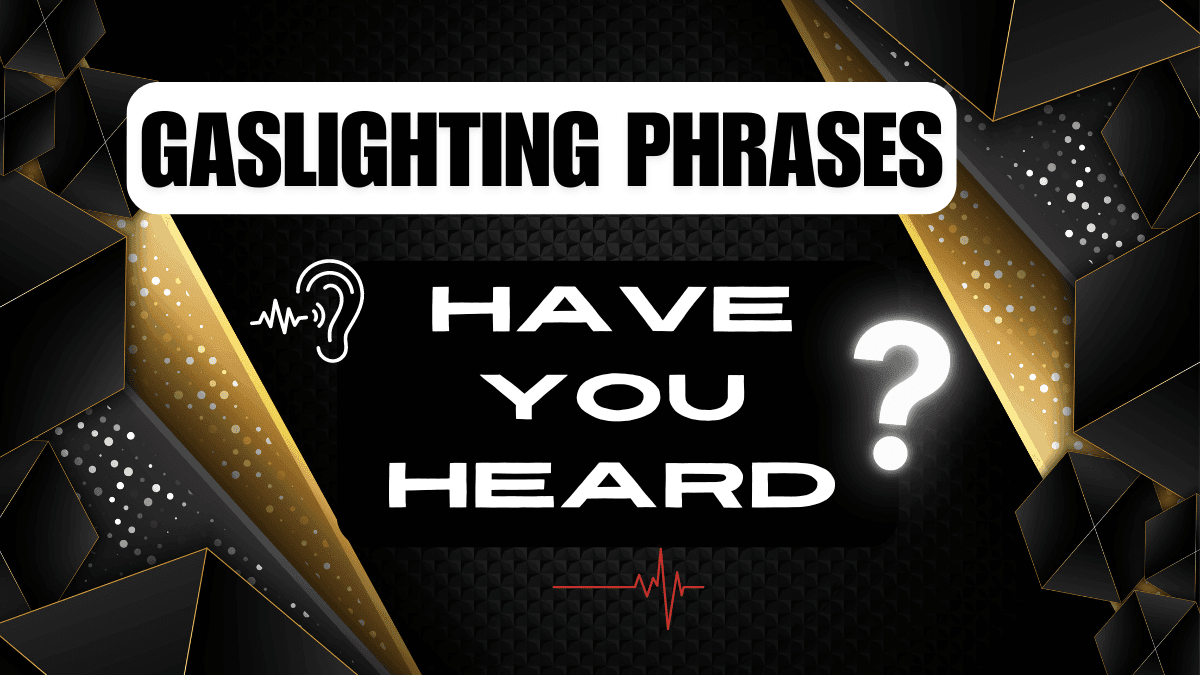6 Common Gaslighting Phrases Used by Narcissists and How to Respond
Have Your Heard the Following Gaslighting Phrases?
Gaslighting is a psychological manipulation tactic used to make someone doubt their own reality, memories, or perceptions. Narcissists are notorious for employing gaslighting as a tool to control and undermine others. Recognizing these tactics is crucial for protecting yourself from their harmful influence. In this article, we’ll explore six common gaslighting phrases used by narcissists and offer strategies on how to effectively respond to them.
1. "You're Overreacting."
One of the most common phrases used by narcissists to gaslight their victims is “You’re overreacting.” This phrase is designed to minimize your feelings and make you question your emotional response to a situation. By dismissing your feelings as an overreaction, the narcissist attempts to invalidate your emotions and make you doubt your own perception of events.
- Response: Calmly assert your feelings by saying, “I’m entitled to my emotions, and they are valid.” By standing firm in your emotional experience, you reinforce your right to feel how you do, despite the narcissist’s attempts to diminish your feelings.
2. "That Never Happened."
Another gaslighting tactic is outright denial, with phrases like “That never happened.” Narcissists use this tactic to distort your memory and create doubt about your recollection of events. The goal is to make you question your reality, leading you to rely more on the narcissist’s version of events rather than trusting your own memory.
- Response: Keep a record of events, such as a journal or notes, to help you stay grounded in your own reality. You can respond by saying, “I remember it differently, and I trust my memory of what happened.”
3. "You're Too Sensitive."
Labeling someone as “too sensitive” is a classic gaslighting tactic that narcissists use to dismiss valid concerns or criticisms. This phrase is intended to make you feel ashamed of your emotions, as though your sensitivity is a flaw. It’s a way to shift the focus from the narcissist’s behavior to your reaction, making you question whether your feelings are justified.
- Response: Acknowledge your sensitivity as a strength rather than a weakness. You might say, “I value my ability to be sensitive and aware of how I feel. My emotions are valid, and I deserve to express them.”
4. "You're Imagining Things."
When a narcissist says, “You’re imagining things,” they are attempting to sow seeds of doubt about your perception of reality. This phrase is often used when you confront the narcissist about their behavior or inconsistencies. By suggesting that you are imagining things, the narcissist seeks to make you question your sanity and the accuracy of your observations.
- Response: Stay confident in your observations by responding, “I’m confident in what I saw or heard. My perception of the situation is clear, and I’m not imagining anything.”
5. "Everyone Else Agrees with Me."
Narcissists often use the phrase “Everyone else agrees with me” as a way to isolate you and make you feel alone in your perspective. This tactic is designed to make you believe that your thoughts and feelings are out of line with the majority, furthering the narcissist’s control over you. It also plays on the fear of social exclusion, making you more likely to conform to the narcissist’s viewpoint.
- Response: Challenge the supposed consensus by saying, “I’m more concerned with my own opinion than what others think. I don’t need others to validate my perspective.”
6. "You're Crazy."
Perhaps the most insidious gaslighting phrase used by narcissists is “You’re crazy.” This phrase is intended to completely undermine your self-esteem and make you question your mental stability. By labeling you as “crazy,” the narcissist seeks to discredit your thoughts, feelings, and observations, rendering you powerless in the relationship.
- Response: Reject the label by stating, “I’m not crazy. I trust my own thoughts and feelings, and I know what’s real for me.” Reinforcing your sense of self can help you resist the narcissist’s attempts to destabilize you.
How to Protect Yourself from Gaslighting
Recognizing gaslighting phrases is the first step in protecting yourself from this form of psychological manipulation. Here are some additional strategies to safeguard your mental and emotional well-being:
Set Boundaries: Establish clear boundaries with the narcissist. Let them know that you will not tolerate dismissive or manipulative behavior. If they cross these boundaries, distance yourself from the situation or end the conversation.
Seek Support: Talk to trusted friends, family, or a therapist about your experiences. Having an outside perspective can help you stay grounded in reality and provide validation for your feelings.
Document Interactions: Keeping a record of conversations, incidents, and how they made you feel can help you maintain clarity in your perception of events. Written documentation can also be useful if you need to reference it later.
Practice Self-Compassion: Be kind to yourself. Gaslighting can erode your self-esteem and self-worth, so it’s essential to practice self-compassion and remind yourself that your feelings are valid and your experiences are real.
Educate Yourself: Learn more about gaslighting and narcissistic behavior. Understanding these tactics can empower you to recognize manipulation early and take steps to protect yourself.
Conclusion: Empowering Yourself Against Gaslighting
Gaslighting is a harmful tactic used by narcissists to control and dominate others by distorting their sense of reality. By recognizing the common phrases and strategies used in gaslighting, you can protect yourself from this psychological manipulation.
Empowering yourself with knowledge, setting boundaries, and seeking support are key steps in maintaining your mental and emotional well-being when dealing with a narcissist. Remember, you have the power to trust your own reality and reject the distorted version that a narcissist tries to impose on you.
gaslighting phrases gaslighting phrases gaslighting phrases gaslighting phrases gaslighting phrases gaslighting phrases gaslighting phrases gaslighting phrases gaslighting phrases gaslighting phrases








